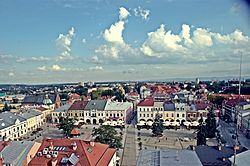
Back كروسنو ARZ کروسنو AZB Кросно Bashkir Кросна Byelorussian Кросна BE-X-OLD Кросно Bulgarian Krosno (kapital sa munisipyo) CEB Krosno Czech Кросьно CU Krosno Danish
This article needs additional citations for verification. (September 2024) |
Krosno
Królewskie Wolne Miasto Krosno | |
|---|---|
 Panorama of the town | |
| Motto(s): Niepowtarzalne miasto w wyjatkowym miejscu Unique city in an uncommon place | |
| Coordinates: 49°41′N 21°45′E / 49.683°N 21.750°E | |
| Country | |
| Voivodeship | |
| County | city county |
| Town rights | 1342 |
| Government | |
| • Mayor | Piotr Przytocki |
| Area | |
• City | 44.7 km2 (17.3 sq mi) |
| Elevation | 260 m (850 ft) |
| Population (2014) | |
• City | 46,934 |
| • Density | 1,000/km2 (2,700/sq mi) |
| • Metro | 115,617 [1] |
| Time zone | UTC+1 (CET) |
| • Summer (DST) | UTC+2 (CEST) |
| Postal code | 38-400 to 38-411 |
| Area code | +48 13 |
| Car plates | RK |
| Website | http://www.krosno.pl/ |
Krosno [ˈkrɔsnɔ] ⓘ (in full The Royal Free City of Krosno, Polish: Królewskie Wolne Miasto Krosno) is a historical town and county in the Subcarpathian Voivodeship, in southeastern Poland. The estimated population of the town is 47,140 inhabitants as of 2014.[1][2]
The functional urban area of Krosno has a population of 115,000 inhabitants.
Krosno is a medieval fortified town, a former Royal Free Town and centre of cloth, linen, canvas, baize and Hungarian wine trade.[3] It is also notable for its glassmaking traditions, which became known as the Krosno Glassware. Until recently it was a provincial capital.
- ^ a b Krosno.pl oficjalna strona Miasta Krosna, Liczba ludnośći MOF: 115617
- ^ "Population. Size and structure by territorial division" (PDF). © 1995-2009 Central Statistical Office 00-925 Warsaw, Al. Niepodległości 208. 2009-06-02. Retrieved 2014-06-30.
{{cite web}}: External link in|publisher= - ^ "Krosno - The Shtetl". www.shtetlinks.jewishgen.org. Retrieved 2009-10-30.


